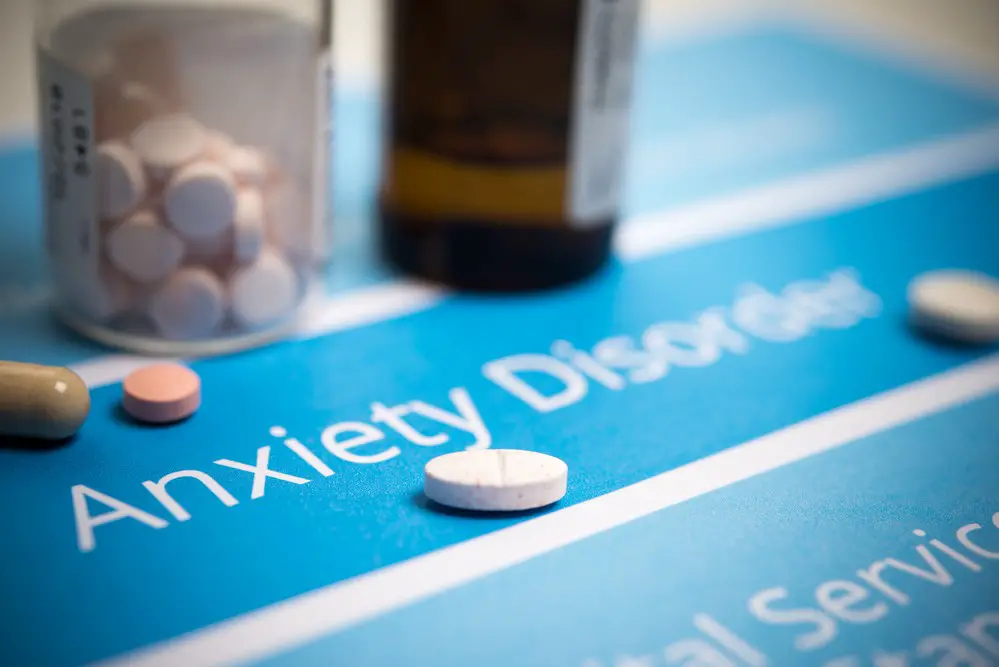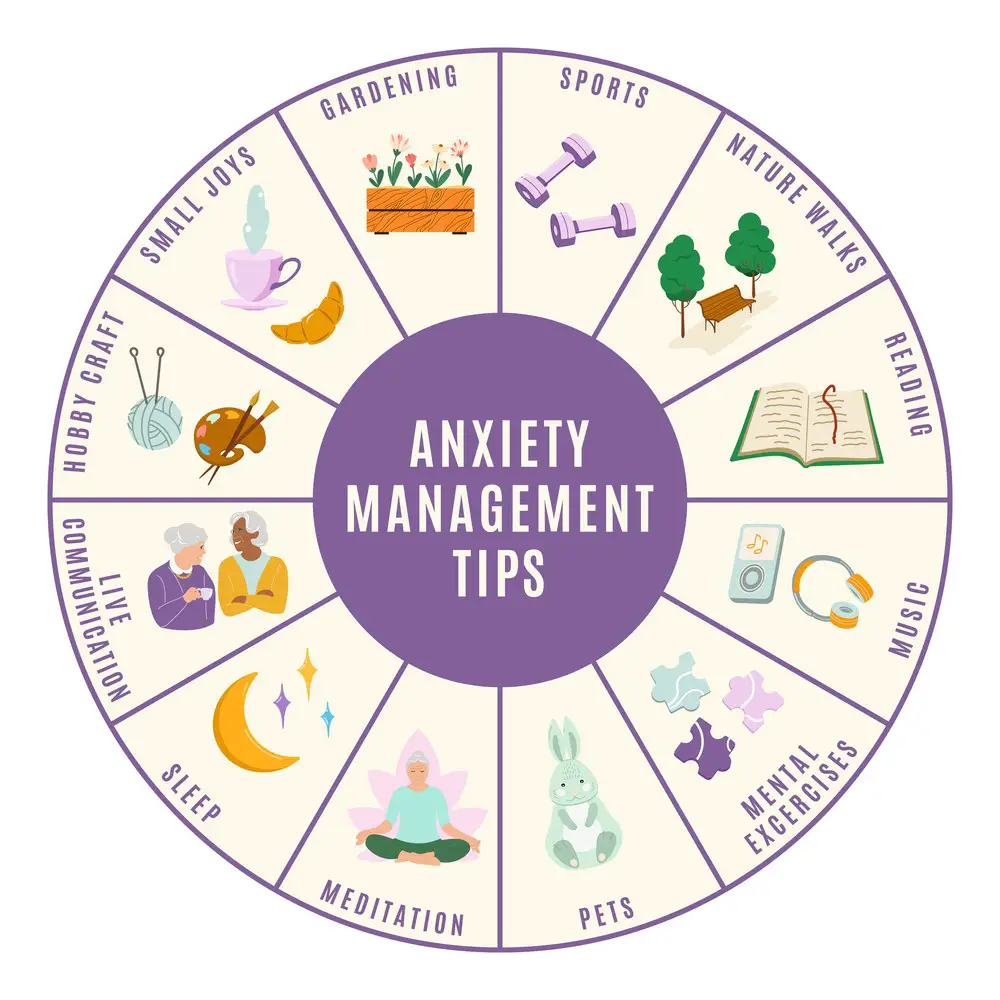As a BetterHelp affiliate, we receive compensation from BetterHelp if you purchase products or services through the links provided
Millions worldwide suffer from anxiety disorders, and effective treatments are crucial. Clonidine, primarily used for high blood pressure, has promising potential in managing anxiety. Its faster onset of action and fewer side effects make it a better alternative to traditional anti-anxiety meds. Clonidine’s off-label use has helped many struggling with anxiety. Proper dosage and recognition of side effects are essential to ensure safe and effective use. Understanding clonidine’s mechanism and how it differs from other medications is crucial for anxiety.
Key Takeaways
- Clonidine is a potential alternative to traditional anxiety medications, with a fast onset of action and fewer side effects.
- Understanding the mechanism of action helps determine the effectiveness of clonidine in managing anxiety disorders.
- Proper dosage and awareness of potential side effects are crucial for the safe and effective use of clonidine for anxiety.
 Understanding Clonidine
Understanding Clonidine
Clonidine is a medication primarily prescribed to treat high blood pressure, also known as hypertension. It belongs to a class of drugs called centrally-acting alpha-2 adrenergic agonists. Stimulating alpha-2 receptors in the brain allows blood vessels to relax and widen, reducing blood pressure and heart rate.
Although clonidine is primarily used for hypertension, it may also be prescribed off-label to manage anxiety. It’s thought to help alleviate anxiety symptoms by reducing the activity of norepinephrine, a neurotransmitter responsible for the body’s fight or flight response. This action leads to a decrease in heart rate, which may reduce anxiety and panic.
While clonidine can be an effective treatment option for some individuals struggling with anxiety, it’s not a first-line treatment option. Doctors typically prescribe selective serotonin reuptake inhibitors (SSRIs) or benzodiazepines for anxiety before considering clonidine. However, in cases where traditional anxiety medications are not tolerated or contraindicated, a doctor may prescribe clonidine as an alternative.
Following a healthcare professional’s guidance when using clonidine for anxiety is essential. The medication should be used exactly as prescribed, and the dosage should not be adjusted without consulting a doctor. Monitoring side effects is vital, as clonidine can cause drowsiness, dry mouth, and constipation. Abruptly discontinuing clonidine usage can rapidly increase blood pressure, so following a doctor’s instructions is crucial when tapering off the medication.
In summary, clonidine is a versatile drug known for its effectiveness in managing high blood pressure, and it may also be useful in addressing anxiety. While not a first-line treatment for anxiety disorders, it can be an alternative option for individuals who cannot take traditional anxiety medications. As with any medication, it’s essential to follow a doctor’s guidance and monitor for side effects while using clonidine for anxiety management.
 Clonidine as An Anti-Anxiety Medication
Clonidine as An Anti-Anxiety Medication
Clonidine is a medication primarily used to treat high blood pressure, but it effectively manages certain anxiety disorders. It works by stimulating alpha-2 receptors in the brain, decreasing the production of stress hormones such as norepinephrine. This leads to a reduction in the symptoms of anxiety.
People who suffer from various anxiety disorders, including generalized anxiety disorder, social anxiety, and panic attacks, may find relief in using clonidine. It is essential, however, to consult with a healthcare professional and obtain proper guidance on the dosage and administration of the medication.
While clonidine for anxiety has been shown to have benefits, it is crucial to be aware of the potential side effects. Common side effects of clonidine include dizziness, dry mouth, sedation, and constipation. Although less common, serious side effects include low blood pressure and slowed heart rate. It is essential to monitor clonidine’s benefits and side effects to manage anxiety effectively.
A key factor when considering clonidine as an anti-anxiety medication is that it may be most effective alongside other treatment methods, such as cognitive-behavioral therapy (CBT). This holistic approach can help individuals better manage their anxiety disorder and live more balanced lives.
In conclusion, using clonidine for anxiety can be an effective option for individuals struggling with anxiety disorders. It is essential to consult with a healthcare professional to determine if clonidine is the right choice for one’s specific needs and to discuss the appropriate dosage and administration methods. Additionally, being aware of possible side effects and combining clonidine with other treatment options can contribute to successful anxiety management.
 Usage and Dosage
Usage and Dosage
Clonidine is a medication that can be prescribed for the treatment of anxiety. It is usually taken as a tablet, although an extended-release tablet version is available for certain purposes.
The recommended starting dosage for adults is typically 0.1 milligrams (mg) twice daily. However, the dosage for children and teenagers may differ, depending on their age, weight, and the severity of their anxiety. Following the physician’s instructions and taking the prescribed dose is crucial.
For children, the appropriate dosage is calculated based on their body weight. The typical starting dose is 0.05 mg per kilogram (kg) of body weight, administered twice daily. However, the healthcare provider can adjust the dosage based on the patient’s needs and progress. Teenagers may be prescribed a dosage similar to adults but could require adjustments based on their response to the medication.
Extended-release tablets are usually taken once daily, with the prescribed physician’s dose. These tablets should not be crushed, chewed, or broken, as doing so can release the medication too quickly, leading to negative side effects.
Some important points to consider when using clonidine for anxiety include:
- Always follow the prescribed dosage and schedule, as exceeding the recommended dose or taking it more frequently than advised could have harmful consequences.
- Do not suddenly stop taking clonidine without consulting a healthcare professional, as this may result in withdrawal symptoms.
- Clonidine should be taken consistently, either with or without food, as altering patterns in consumption can affect the medication’s effectiveness.
- In case of a missed dose, take it as soon as possible unless it is almost time for the next scheduled dose. In such cases, skip the missed dose and continue with the regular schedule. Do not take extra medication to compensate for the missed dose.
By following the appropriate guidelines for usage and dosage and working closely with their healthcare provider, patients can effectively use clonidine to manage their anxiety symptoms.
 Potential Side Effects
Potential Side Effects
While often effective for managing anxiety, Clonidine may have certain side effects. These can vary from person to person, but common side effects include drowsiness, constipation, dizziness, headache, nausea, vomiting, dry mouth, insomnia, diarrhea, fever, and sore throat.
Many users may experience drowsiness due to clonidine’s sedating properties. Individuals must know this potential side effect, particularly if they operate heavy machinery or drive.
Constipation is another potential side effect that some people may encounter. To help alleviate this symptom, it is advised to increase dietary fiber intake, drink plenty of water, and engage in regular physical activity as permitted by the individual’s health condition.
Dizziness and headache can also be occasional side effects experienced by individuals taking clonidine. Standing up slowly when getting up from a sitting or lying position is recommended to prevent dizziness. Maintaining regular hydration and managing stress levels may help reduce headache frequency.
Nausea and vomiting might occur for some individuals using clonidine. To manage these symptoms, taking the medication with food is suggested, and avoiding lying down immediately after the dose.
Dry mouth can also be experienced by some patients due to clonidine’s effect on saliva production. Frequently sipping water, chewing sugar-free gum, or using saliva substitutes may help alleviate this symptom.
Some individuals may also experience insomnia while taking clonidine. Developing a consistent sleep schedule, creating a relaxing bedtime routine, and avoiding caffeine or stimulating activities before bedtime might contribute to a better night’s sleep.
Diarrhea, fever, and sore throat are less common side effects. Nevertheless, they should be monitored. In the case of persistent and bothersome side effects or the development of fever and sore throat, it is important to consult a healthcare provider promptly for further evaluation and appropriate management.
 Comparison with Other Anxiety Medications
Comparison with Other Anxiety Medications
Clonidine, typically prescribed for hypertension, has also effectively managed anxiety disorders. Compared to other anxiety medications, such as Benzodiazepines and SSRIs, clonidine offers some distinct advantages and differences.
Benzodiazepines, like Xanax (alprazolam) and clonazepam, are often prescribed for anxiety due to their fast-acting anxiolytic effects. However, they can also lead to dependence and have a higher potential for abuse. Compared to benzodiazepines, clonidine generally has lower misuse potential and a more favorable safety profile. Moreover, while benzodiazepines can cause drowsiness, clonidine’s sedative effects are typically less pronounced.
SSRIs (Selective Serotonin Reuptake Inhibitors), such as fluoxetine and sertraline, are other drugs commonly prescribed for anxiety disorders. These medications work by increasing the amount of serotonin in the brain, a neurotransmitter associated with mood regulation. Clonidine and SSRIs differ in their mechanisms of action; clonidine acts on alpha-2 adrenergic receptors, decreasing the release of norepinephrine and reducing anxiety symptoms. This alternative mode of action can make clonidine an appropriate choice for those who may not respond well to SSRIs.
It is important to note that clonidine may not be the first-line treatment for anxiety, as it does not specifically target anxiety symptoms. However, it can be an option for individuals without success with other medications, those with co-occurring hypertension, or other medical conditions that benzodiazepines or SSRIs might exacerbate.
In summary, while clonidine is not the primary medication for anxiety disorders, it offers a different mechanism of action and can be a helpful alternative for some patients. Comparing clonidine to benzodiazepines and SSRIs reveals its unique advantages, indications, and limitations in anxiety management.
Discontinuing Clonidine
When it comes time to discontinue clonidine for anxiety, it is important to follow a gradual tapering process in consultation with a healthcare professional. Stopping clonidine abruptly can lead to withdrawal symptoms, so it’s crucial to taper off the medication in a controlled manner.
Some withdrawal symptoms that may be experienced include:
- Rebound hypertension (a sudden increase in blood pressure)
- Headaches
- Nervousness
- Rapid heart rate
- Sweating
- Nausea
A healthcare provider typically creates a personalized tapering schedule to reduce the risk of these symptoms. This might involve gradually decreasing the clonidine dose over a set period, often from several days to a few weeks, depending on individual factors and the specific type of clonidine product used.
Patients must regularly contact their healthcare provider throughout the tapering process. Monitoring vital signs, particularly blood pressure, is crucial to ensure a safe and successful withdrawal from clonidine.
If an individual experiences severe or persistent withdrawal symptoms while stopping clonidine, they should promptly consult their healthcare provider. Sometimes, a slower taper or temporary reinstatement of a lower clonidine dose may be necessary to manage these symptoms.
In conclusion, when discontinuing clonidine for anxiety, a gradual tapering process under the guidance of a healthcare professional is vital to minimize withdrawal symptoms and ensure patient safety. Regular communication with the provider and careful monitoring of vital signs can help facilitate a smooth and successful discontinuation of the medication.

When Therapy is Necessary with Clonidine Treatment:
While Clonidine can be highly beneficial in managing anxiety symptoms, it’s important to recognize that medication alone might not address the root causes or the multidimensional aspects of anxiety. Here’s when incorporating therapy can be crucial:
- Chronic or Persistent Symptoms: Even with medication, if one’s anxiety symptoms continue to be disruptive, therapy can offer additional tools and strategies. It can help to uncover underlying triggers and provide coping mechanisms tailored to individual needs.
- Addressing Root Causes: For many, anxiety isn’t just a chemical imbalance but may be rooted in past traumas, life experiences, or ongoing challenges. Therapy can help delve into these underlying issues, providing a platform for healing and understanding.
- Skill-building: Cognitive Behavioral Therapy (CBT), among other therapeutic approaches, can teach individuals skills to manage their anxiety, such as thought reframing, mindfulness, and relaxation techniques.
- Concerns About Medication Dependency: Some individuals might be concerned about becoming too reliant on medication. In such cases, therapy can offer an additional or alternative avenue for managing anxiety, potentially reducing the need for medication or complementing its effects.
- Holistic Healing: Addressing anxiety from multiple physiological, emotional, and cognitive angles can offer a more holistic and comprehensive healing approach. Combining therapy with medication can provide this rounded approach, ensuring that one is addressing the symptoms, underlying causes, and emotional ramifications.
Frequently Asked Questions

What is the recommended dosage of clonidine for anxiety?
The recommended dosage of clonidine for anxiety varies based on the severity of symptoms and individual response to the medication. Generally, a starting dose of 0.1 mg twice daily is prescribed. The dosage can be gradually increased as needed, with the maximum dose typically ranging from 0.2 to 0.6 mg per day, divided into two or three doses. However, dosages should always be personalized and closely monitored by a healthcare professional.
How long does it take for clonidine to work in treating anxiety?
The time it takes for clonidine to treat anxiety can vary depending on the individual. Some people may experience relief from anxiety symptoms within days, while others may not notice any significant changes for a few weeks. As with any medication, it is crucial to communicate with your healthcare provider throughout the treatment process and to have patience during the initial adjustment period.
Is clonidine effective for anxiety in adults?
Clonidine can effectively manage anxiety in some adults, particularly those with a history of substance abuse or who need to avoid sedative medications. However, clonidine is not a first-line treatment for anxiety disorders and may be more beneficial when used with other therapies or medications. Always consult a healthcare provider to determine if clonidine suits your needs.
When should clonidine be used to treat anxiety?
Clonidine may treat anxiety when other treatments, such as therapy and first-line anxiety medications, have been unsuccessful or produce undesirable side effects. Clonidine can also be used as an adjunct treatment in cases where an individual is experiencing clinical anxiety alongside other medical conditions, such as attention deficit hyperactivity disorder (ADHD) or withdrawal symptoms from substance abuse.
What are the differences between propranolol and clonidine for anxiety?
Propranolol and clonidine are both medications that can be prescribed to manage anxiety symptoms. The primary difference is that propranolol is a beta-blocker, while clonidine is an alpha-2 adrenergic agonist. Propranolol primarily addresses physical symptoms of anxiety, such as racing heart and tremors, while clonidine can have a broader effect on anxiety and other associated symptoms. Each medication has its own set of potential side effects, and the choice between the two depends on the individual’s specific needs and medical history.
Are there any patient reviews on the effectiveness of clonidine for anxiety?
Patient reviews on the effectiveness of clonidine for anxiety can be found on various online platforms and forums. However, it is crucial to remember that these reviews are based on individual experiences and should not be taken as a definitive indication of how the medication will affect you. Always consult your healthcare provider for personalized guidance and to discuss whether clonidine may be suitable for managing your anxiety symptoms.
Jacob Maslow: A Journey Through Mental Health and Pursuing Justice
Hello, I’m Jacob Maslow. As someone who has navigated the labyrinth of mental health for a significant portion of my life, I understand the complexities and challenges one can face. To manage my mental health, I have leaned on Lexapro. I consider myself a therapy veteran, having invested years into understanding myself and striving for a better mental state.
Life, however, always has its trials. My journey has been marked by an ongoing court battle with my ex, who unfortunately suffers from severe narcissism. My challenges are heart-wrenching – a complete alienation from our children, whom I deeply cherish and have a very close relationship with for years. Despite court-ordered shared custody, my ex defies these orders, refusing communication between me and our kids.
This situation has led me to develop coping mechanisms, one of which is taking long walks daily. I clear my head, reflect, and gather strength during these walks. With each step, I remind myself of my love for my kids and the importance of advocating for them and justice.
Drawing from my personal experiences, I write articles on mental health and narcissism. I aim to guide and support others dealing with narcissistic partners or facing mental health challenges. Anyone can overcome their mental health issues with the right tools and support.
Furthering my advocacy, I have also founded a legal site. Its purpose is to assist those who, like me, are grappling with spouses who weaponize children instead of co-parenting and those who constantly defy court orders. Through my experiences and knowledge, I aim to be a beacon of hope and guidance for those facing similar challenges.
Remember, you’re not alone on this journey, and with resilience and the right resources, we can overcome anything.
- Breaking the Silence: Why Men’s Mental Health Matters More Than Ever - April 15, 2025
- How to Transform a Home’s Patio Space into a Relaxing Space - March 23, 2025
- 5 Strategies to Use a Cell Phone to Help Manage Your Stress - March 23, 2025
This site contains affiliate links to products. We will receive a commission for purchases made through these links.


 Understanding Clonidine
Understanding Clonidine Clonidine as An Anti-Anxiety Medication
Clonidine as An Anti-Anxiety Medication Usage and Dosage
Usage and Dosage Potential Side Effects
Potential Side Effects Comparison with Other Anxiety Medications
Comparison with Other Anxiety Medications
